Analyte Specific Reagent. Analytical and performance characteristics are not established.
- Clone
- BA5b
- Workshop
- VI N-L078
- Other Names
- ADA-binding protein, DPP IV ectoenzyme, EC 3.4.14.5
- Isotype
- Mouse IgG2a, κ

-

Typical results from human peripheral blood lymphocytes stained either with BA5b PE/Cyanine7 used at 5 μL/test (filled histogram) or with an isotype control (open histogram).
CD26 is a 110 kD type II membrane protein also known as ADA-binding protein and dipeptidyl peptidase IV (DPPIV). It is a member of the peptidase and ectoenzyme family. CD26 is expressed on the membrane of mature thymocytes, T lymphocytes (upregulated upon activation), B cells, NK cells, and macrophages. CD26 cleaves off N-terminal X-Pro and X-Ala dipeptides from polypeptides. It plays an integral role as a costimulatory molecule in T cell activation. CD26 may interact with extracellular matrix proteins such as fibronectin or collagen, CD45 and ADA.
Product DetailsProduct Details
- Reactivity
- Human
- Formulation
- Phosphate-buffered solution, pH 7.2, containing True-Stain Monocyte Blocker™, 0.09% sodium azide, 0.2% (w/v) BSA (origin USA), and a stabilizer.
- Preparation
- The antibody was purified by affinity chromatography and conjugated with PE/Cyanine7 under optimal conditions.
- Concentration
- 50 µg/mL
- Storage & Handling
- The antibody solution should be stored undiluted between 2°C and 8°C, and protected from prolonged exposure to light. Do not freeze.
- Application
-
Suggested for Flow Cytometry
- Disclaimer
-
WARNINGS AND PRECAUTIONS
- Use appropriate personal protective equipment and safety practices per universal precautions when working with this reagent. Refer to the reagent safety data sheet.
- This antibody contains sodium azide. Follow federal, state and local regulations to dispose of this reagent. Sodium azide build-up in metal wastepipes may lead to explosive conditions; if disposing of reagent down wastepipes, flush with water after disposal.
- All specimens, samples and any material coming in contact with them should be considered potentially infectious and should be disposed of with proper precautions and in accordance with federal, state and local regulations.
- Do not use this reagent beyond the expiration date stated on the label.
- Do not use this reagent if it appears cloudy or if there is any change in the appearance of the reagent as these may be an indication of possible deterioration.
- Avoid prolonged exposure of the reagent or stained cells to light.
Antigen Details
- Antigen References
-
- Kameoka J, et al. 1993. Science. 261:466.
- Dang N, et al. 1990. J Exp Med. 172:649.
Compare Data Across All Formats
This data display is provided for general comparisons between formats.
Your actual data may vary due to variations in samples, target cells, instruments and their settings, staining conditions, and other factors.
If you need assistance with selecting the best format contact our expert technical support team.
-
FITC anti-human CD26
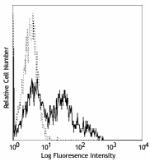
Human peripheral blood lymphocytes stained with BA5b FITC -
PE anti-human CD26
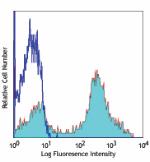
Human peripheral blood lymphocytes stained with BA5b PE -
PE/Cyanine5 anti-human CD26
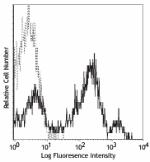
Human peripheral blood lymphocytes stained with BA5b PE/Cyan... -
Purified anti-human CD26

Human peripheral blood lymphocytes stained with BA5b PE/Cyan... -
APC anti-human CD26
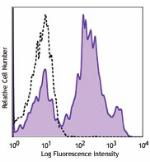
Human peripheral blood lymphocytes were stained with CD26 (c... -
PE/Cyanine7 anti-human CD26
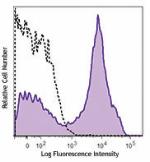
Human peripheral blood lymphocytes were stained with CD26 (c... -
PerCP/Cyanine5.5 anti-human CD26
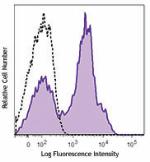
Human peripheral blood lymphocytes were stained with CD26 (c... -
Biotin anti-human CD26
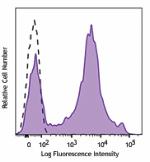
Human peripheral blood lymphocytes were stained with biotiny... -
TotalSeq™-A0396 anti-human CD26
-
TotalSeq™-C0396 anti-human CD26
-
KIRAVIA Blue 520™ anti-human CD26

Human peripheral blood lymphocytes were stained with CD3 APC... -
TotalSeq™-B0396 anti-human CD26
-
TotalSeq™-D0396 anti-human CD26
-
FITC anti-human CD26
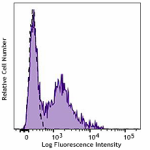
Typical results from human peripheral blood lymphocytes stai... -
PE anti-human CD26
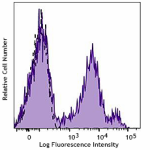
Typical results from human peripheral blood lymphocytes stai... -
PE/Cyanine7 anti-human CD26

Typical results from human peripheral blood lymphocytes stai... -
Spark Red™ 718 anti-human CD26 (Flexi-Fluor™)
-
GMP FITC anti-human CD26

Typical results from human peripheral blood lymphocytes stai... -
GMP PE anti-human CD26

Typical results from human peripheral blood lymphocytes stai...






Follow Us